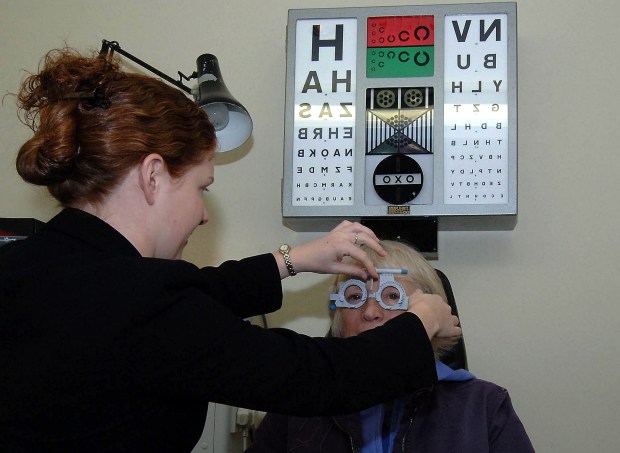Soon high street eye tests could spot the early signs of dementia
New way of diagnosing condition could help medics treat condition before symptoms become too bad

SIMPLE eye tests available on the high street could be used to spot dementia YEARS before sufferers experience memory symptoms, new research suggests.
Researchers at Moorfields Eye Hospital and the UCL Institute of Ophthalmology found a link between poor cognitive ability - a "clear warning sign" of the early stages of Alzheimer's - and the thickness of people's retinal nerves.
In a trial of more than 33,000 people, who had tests on memory, reaction time and reasoning, eye scans showed the nerve fibre layer was "significantly thinner" among those who performed badly on cognitive tests.
The findings, presented at the Alzheimer's Association International Conference in Toronto, Canada, could be key as doctors believe diagnosing the condition early is "essential".
While medics cannot halt dementia, the results of the study have led doctors to believe that intervening before symptoms become too severe provides the best chance to avoid the worst effects of the condition.
Healthy living and drugs to control the symptoms can help - and world leaders have promised a medicine to stop the disease within a decade.
Dr Clare Walton, research manager at Alzheimer's Society, said: "Changes in the brain associated with dementia can begin several years before any memory symptoms appear. This research suggests that some of these changes happen in the retina of the eye too, which could give us a relatively easy, non-invasive way to spot them early.
"Eye tests are fairly common for older people, so there is great potential to incorporate additional tests into their regular check-up."
While the tests could help with early intervention, it is not expected to be the first way to diagnose the condition, she added.
Related stories
Dr Simon Ridley, director of research at Alzheimer's Research UK, said the tests could help identify people at risk of memory decline, but more research was needed.
He said: "While this study did not look at changes in people with dementia, it does show that thinning of a layer of cells in the retina is associated with reduced cognitive performance. Further work is needed to see whether thinning of the retinal nerve fibre layer is predictive of cognitive decline and dementia."
Other findings presented at the US conference suggest smell tests could help detect early-stage Alzheimer's disease.
Researchers from Columbia University Medical Centre used a 40-item "scratch and sniff" test on 397 adults with an average age of 80.
Four years later 50 participants had developed dementia, and researchers found low test scores were "significantly associated" with dementia and Alzheimer's disease.
Dr Rosa Sancho from Alzheimer's Research UK said: "This research suggests a potentially simple and cost-effective way to identify those at risk of memory decline, but while an odour detection test could bolster current diagnostic approaches like brain scanning and pen and paper tests, this test is not yet able to reliably predict who will develop dementia in future."
We pay for your stories! Do you have a story for The Sun Online news team? Email us attips@the-sun.co.uk or call 0207 782 4368.














